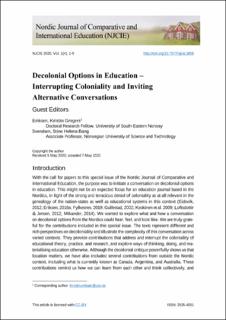Decolonial Options in Education – Interrupting Coloniality and Inviting Alternative Conversations
Peer reviewed, Journal article
Published version
Permanent lenke
https://hdl.handle.net/11250/2754710Utgivelsesdato
2020Metadata
Vis full innførselSamlinger
Originalversjon
Eriksen, K. G., & Svendsen, S. H. B. (2020). Decolonial options in education–interrupting coloniality and inviting alternative conversations. Nordic Journal of Comparative and International Education (NJCIE), 4(1). https://doi.org/10.7577/njcie.3859Sammendrag
With the call for papers to this special issue of the Nordic Journal of Comparative and International Education, the purpose was to initiate a conversation on decolonial options in education. This might not bean expected focus for an education journal based in the Nordics, in light of the strong and tenacious denial of coloniality as at all relevant in the genealogy of the nation-states as well as educational systems in this context (Eidsvik, 2012; Eriksen, 2018a; Fylkesnes, 2019; Gullestad, 2002; Keskinen et al. 2009; Loftsdottir & Jensen, 2012; Mikander, 2014). We wanted to explore what and how a conversation on decolonial options from the Nordics could hear, feel, and look like. We are truly grateful for the contributions included in this special issue. The texts represent different and rich perspectives on decoloniality and illustrate the complexity of this conversation across varied contexts. They provide contributions that address and interrupt the coloniality of educational theory, practice, and research, and explore ways of thinking, doing, and materialising education otherwise. Although the decolonial critique powerfully shows us that location matters, we have also included several contributions from outside the Nordic context, including what is currently known as Canada, Argentina and Australia. These contributions remind us how we can learn from each other and think collectively, and how the conversation on decoloniality must be at once local and global. This is fundamental when starting from the field of Comparative and International Education (CIE), which while aiming at celebrating the diversity of education around the world is still embedded in colonial logics and Eurocentric perspectives (Takayama et al., 2017).

